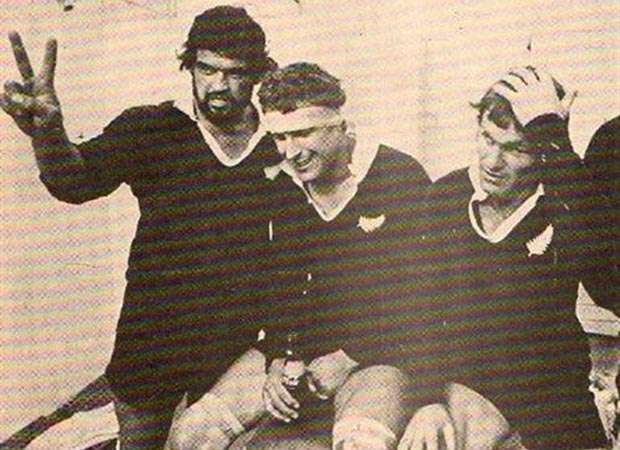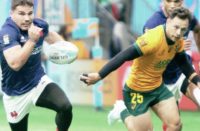 It's 40 years pretty much to the day that a rugby tour wreaked havoc with the 1976 Montreal Olympics, a financially precarious Olympiad that could frankly have done without the political storm that engulfed it after New Zealand controversially decided to go ahead with their fourth tour of apartheid ridden South Africa.
It's 40 years pretty much to the day that a rugby tour wreaked havoc with the 1976 Montreal Olympics, a financially precarious Olympiad that could frankly have done without the political storm that engulfed it after New Zealand controversially decided to go ahead with their fourth tour of apartheid ridden South Africa.
The knock-on effect of that fateful decision was massive and unseen with 33, mainly African nations, eventually withdrawing from the Games. Senegal and the Ivory Coast were the only sovereign African states to compete in Canada.
Kenya withdrew their team a couple of hours before the opening ceremony – presided over by the Queen – while Nigeria actually participated in the preliminary festivities before thinking better of it and heading for home. Egypt, Morocco and Cameroon participated in events on the opening day before packing their bags.
It was a devastating PR blow for the Games and the athletics programme in particular suffered, being deprived of two of its biggest stars in Tanzania's world 1500m champion Filbert Bayi and Uganda's reigning Olympic 400m hurdles champion John Aki-Bua.
Bayi had stunned the world two years earlier with his 1500m world record in a mano a mano clash with Kiwi John Walker at the Commonwealth Games in Christchurch, and their re-match was probably the most eagerly await event of the entire Games.
Tanzania, however, were among the first nations to withdraw in protest at the New Zealand tour while, ironically, because rugby was not then an Olympic sport, the IOC refused to sanction against New Zealand and Walker proceeded to win a rather routine gold medal.
Aki-Bua had won in Munch in 1972 with a world record time and his clash with Ed Moses was another to savour. Alas, that was another extraordinary race the world was destined never to see although Moses did turn it on and break the world record himself.
In short, New Zealand's stubborn insistence on touring did Montreal no favours at all and, at 40 years distance, seems inexcusable. Nelson Mandela was already 12 years into his prison sentence at Robben Island and still had another six years there and another eight years incarceration at Pollsmoor and Victor Verster prison to endure. The apartheid system was as entrenched and grim as it had ever been.
New Zealand's Maori contingent – Billy Bush, Sid Going, Bill Osborne, Kent Lambert and Tane Norton – and their Samoan heritage player Bryan Williams had to be declared honorary white men for the duration of the tour so they could be treated the same as the team-mates.
Sensibilities were different and although South Africa had been banned from the Olympics since 1964, rugby, outside of the Olympic movement, was still doing its own thing convinced that contact and not isolation was the only way influence could be brought to bear. Or perhaps that's paying the game too much credit; the truth is that South Africa was the most prized touring venue of all in the amateur days and precious few of those picked by their countries for the trip of a lifetime gave much consideration to the regime they were tacitly supporting.
The Lions toured in 1974 and were again to tour in 1980 and in 1976 the rugby authorities from South Africa and New Zealand rather disingenuously pointed to the fact that 26 national teams had visited the country participating in various other sports. Possibly true, but you could multiply their collective impact in terms of legitimising the South African regime by ten and still come nowhere near to that of the presence of the All Blacks.
The tour, although not universally popular in New Zealand, had been given the green light by the newly-elected Prime Minister Robert Muldoon, and what transpired was the ‘Full Monty', an old style 24 match, three month, tour around the country including four Tests.
The first Test, a 16-7 defeat at King's Park, Durban, took place on the same day as the athletics programme was getting underway in earnest in Montreal with Hasley Crawford beating Don Quarrie in the 100m championship with reigning champion Valeriy Borzov taking the bronze.
What transpired was a very competitive, snarly, series in front of huge crowds but then again you wouldn't expect anything different between the two rugby superpowers no matter what the circumstances.
The All Blacks, although hampered by the lack of a front line goal kicker, hit back (15-9) in the second Test in front of 71,000 fans at the old Bloemfontein Stadium with a brilliant solo try by inside centre Joe Morgan being the highlight. In the third Test, however, they were profligate in blowy conditions at Newlands and poor goalkicking and an opportunist try from Boks centre JJ Oosterhuizen, after New Zealand spilled the ball while attacking, heralded a 15-10 defeat.
Going into the final Test at Ellis Park New Zealand needed to summons something special to draw the series and seemed to have accomplished precisely that when they led 14-12 in the final minute. At which juncture the referee Mr Bezuidenhoot, who they had struggled with in the three internationals he had taken charge of, mystifyingly awarded a penalty against Billy Bush for allegedly blocking at a lineout. Fly-half Gerald Bosch needed no second invitation and gratefully smashed over the series-winning penalty.
It had been rough going on and off the pitch. A rather shocked Andy Leslie concluded afterwards that “South Africa is a country at war” while Terry McLean wrote a famous tour book Goodbye to Glory, a twin edged title hinting at both New Zealand's fall from grace and the game's loss of innocence generally.
McLean wrote: “We 43 Kiwi's who in one way and another were embroiled in the All Blacks' tour – 31 players, two managers, five Press reporters, three Press photographers, a radio commentator and a television commentator – heard only distantly and occasionally about the Montreal walk-out. Nevertheless, it was plain that many New Zealanders who supported the tour were shocked by the wholesale surge of politics into sport.
“Contemplating some of the millions of disadvantaged citizens of the country, disadvantaged because of their colour, looking at those places like Soweto and Guguletu and Mdantsane and so on where they lived, happening upon statistics as to the principal destroyer, malnutrition, of young life, comparing the glories of White Supremacy with the squalor of Black Inferiority, one inevitably asked oneself the question: are congenial relationships in sport all that one would want of the world?”


























